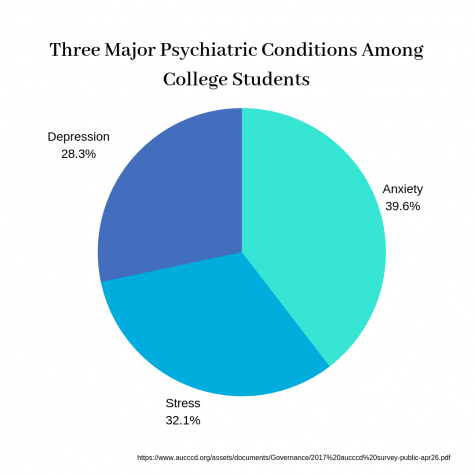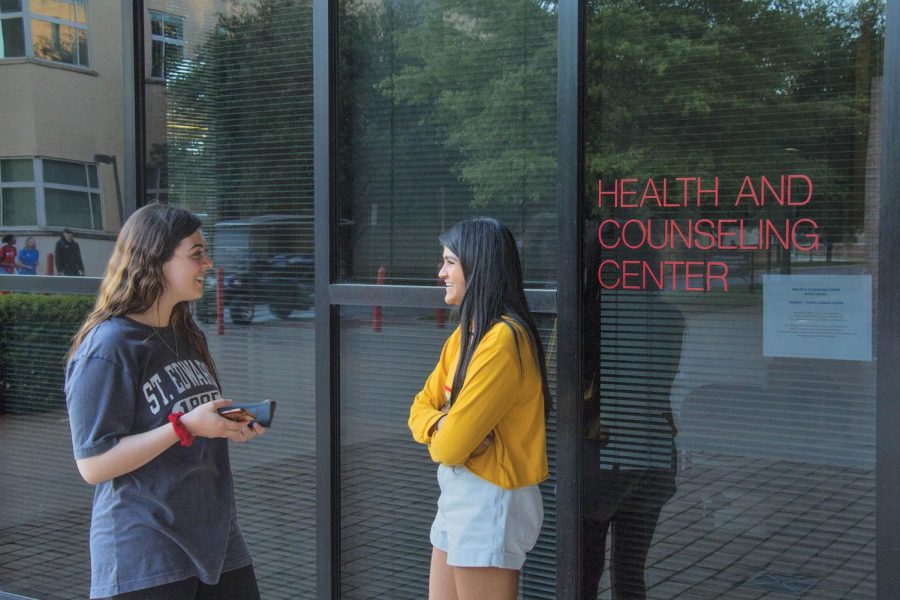Mental health issues affect student relationships
Eighty percent of college students feel overwhelmed by their responsibilities as students, according to a study conducted by the National Alliance on Mental Illness (NAMI). 50 percent have anxiety that has affected their performance in school. Despite this, 40 percent of students do not seek help to improve their mental health.
There can be many reasons why students don’t seek help, one being that they are scared of how they may be perceived by those close to them. Those who do report say they do so to receive clinical services and to reduce stigma for other students.
At St. Edward’s University, the Health and Counseling Center provides services for students to improve their physical and mental health.
Michael Hershberger is a Staff Psychologist and Group Coordinator at the HCC and says that “good mental health is imperative for the success of anyone in any field — whether you’re a student, whether you work in a grocery store, whether you’re a graduate or undergraduate.”
The quality of students’ mental health can impact their relationships in other areas of their lives.
“If [students’ mental health] is not okay, then that impacts their ability to sleep, focus, learn and retain things. It also impacts their relationships with family, friends, significant others, roommates — it kind of branches out into all areas of their lives,” Hershberger says.
As a Group Coordinator, Hershberger leads therapy group sessions on campus, which are designed to give students a place to talk with a group of peers who are going through similar things.
This year, the HCC offered two therapy groups, one on relationships and another on social anxiety.
Hershberger says that groups help build encouragement among students and “helps multiple students deal with similar issues.”
These groups begin several weeks into a new semester. HCC staff advertises new groups with flyers around campus, and other departments in the university are informed of the groups to refer students they think might benefit from group counseling.
Hershberger says that the HCC is currently looking to add a variety of meeting times each semester so that more students can participate in group therapy without being hindered by their class or work schedule.
Through therapy groups, students are able to foster relationships with their peers in the groups and the group facilitators.
“Our job as facilitators and co-facilitators is to be able to use that energy and steer it into the direction where we feel like it needs to go,” Hershberger says.
Hershberger says students seeking any type of counseling service can come in to the HCC at anytime to set up an appointment.
“Someone comes in looking for assistance and one of our counselors will meet with the student and go through a series of brief screening questions to figure out what sort of appointment will fit them best,” Hershberger says.
Hershberger says the HCC counseling staff operates under a brief therapy model, where they offer four sessions per student, and students meet on a bi-weekly basis.
“This helps with acute issues, teaches [students] coping skills and helps them gain perspective so they can resume their normal lives,” he says.
Hershberger says that counselors work to change students’ perspectives through counseling.
“We have a lot of students that come in that care for a lot of people. They give, give, give, and then they have nothing left for themselves. That’s a big reason why they’re struggling. We help them re-adjust their priorities so they can focus on taking care of themselves first. If you’re not okay, you’re not going to be able to help anybody else,” he says.
For students who need more than the allotted four sessions, the HCC has an on-site case manager who will help students find a counseling service in the Austin community.
According to NAMI, 73 percent of students said they experienced a mental health crisis while in college. Triggers of these crises included extreme feelings of anxiety, panic about school and life, stress about course load and homesickness.

Hershberger says that it’s best for students to seek out help sooner rather than later.
“That’s one of the things that we will see is ‘I’m just gonna push it down and ignore it and I’m not gonna deal with it.’ Everyone can do that and sometimes needs to do that temporarily, but it’s when it becomes more of a regular thing is when it gets so pressurized that it’s gonna explode. You’re holding it together, and all of a sudden, boom, everything falls apart,” Hershberger says.
“You can only do it for so long,” I offer.
“You can only do it for so long, right,” he says.
Sophomore French major Emily Persons says that good mental health helps students enjoy their college experience.
“Good mental health makes such a difference in your grades and school work. You have more drive to learn, show up to class and study, while also getting excited about your future,” Persons says.
“For me, my mental health has changed in the sense that I’m more anxious about a lot, this inhibits my ability and drive to do things, which leads to feeling depressed. College has taught me to figure out what choices are good for my mental health and which ones make my anxiety worse. I also have to set aside time to just chill and figure out what I need to do to make it through the bad moments.”
